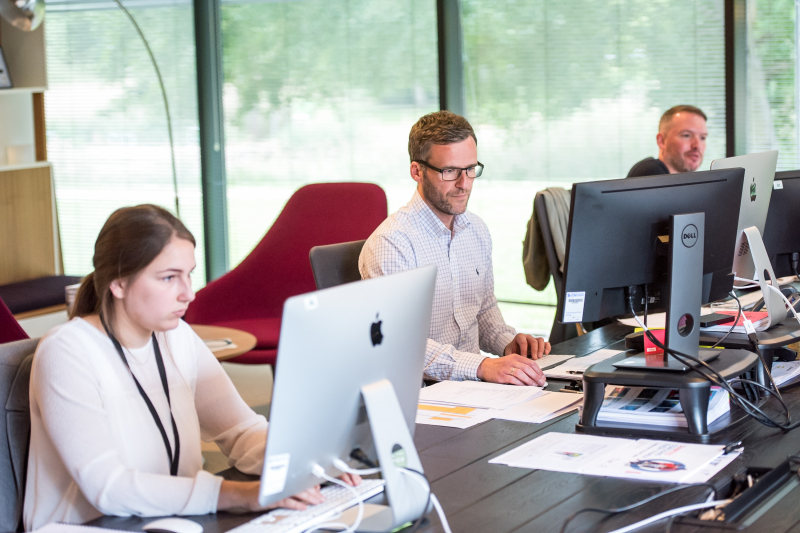Top 13 Most Asked Time Management Interview Questions with Answers
The interviewers test your ability to handle conflicting goals and demands at work by asking time management interview questions. Task prioritization, good ... read more...delegation, and accurate time estimation are all characteristics of effective time managers. You can advance in the hiring process by providing a compelling response. Here are some of the Most Asked Time Management Interview Questions with Answers that the hiring manager might ask in your next job interview.
-
This interview question is used by employers to examine your time management abilities and your capacity to differentiate between urgent and significant jobs. If you were hired for the position, the interviewer will tell how you would handle and finish your work assignments based on your response to this question.
Employers can see that you can handle a variety of tasks and function well on the job by highlighting your organizational abilities, time management skills, and capacity to maintain a healthy work-life balance. You need to show the employer your time management skills as well as how to organize your work in a scientific and orderly manner. That would make you a good candidate. This is one of the Most Asked Time Management Interview Questions.
Example:
In order to meet the needs of the business and fulfill my obligations as an office administrator, I prioritize my tasks. In order to reflect my most critical responsibilities, such as engaging with clients and sharing team updates, I structure my workload. I follow up on my urgent work with my significant organizational duties, such drafting the topic summaries for our regular team meetings. This method of prioritizing my work allows me to maintain a good balance between my professional and personal lives while yet leaving room for future improvements.

Image by Anete Lusina via pexels.com 
Image by Gustavo Fring via pexels.com -
In the majority of organizations, events can happen that force professionals to miss a deadline. A hiring manager may question candidates during a job interview about their capacity to fulfill deadlines and how they respond to difficult circumstances, such as by saying, "Tell me about a time when you missed a deadline." You can demonstrate your capacity to adjust to difficult circumstances and gain insight from earlier errors by putting some thought into your response to this question.
Example:
I used to be a part of a remote team working on a new project in a prior position. Due to the constant delays in the dependent deliverables, our team had little time to complete its tasks. I got in touch with the rest of the team when it became obvious that we would miss the deadline to strategize the best course of action.When we met with our manager, we let him know we wouldn't be able to finish the project on time. In order to produce a practical solution in the shortest amount of time possible, we agreed to prioritize our work based on the relative relevance of each task to the project. I see for myself that my task right now is to ensure the benefits of each team member and the company, as well as complete the work schedule in the best possible way. Therefore, only a reasonable way of arranging work can do that.

Image by Mikhail Nilov via pexels.com 
Image by Mikhail Nilov via pexels.com -
Businesses love to use lots of inspirational language and "power words" when discussing the jobs and obligations you will have in the future in their job advertisements. They make an effort to persuade you to accept the offer, get you excited about the opportunity, and submit an application. But in reality, whether you're talking about manual labor or office employment in large organizations, 90% of all jobs involve a lot of repetition. You will follow a routine and be required to perform repetitious chores. Hour after hour, day after day, and week after week. They logically want to know how you manage it.
But, the question isn't as challenging as it might appear to someone who is unfamiliar with the interview process. As a general rule, you should try to persuade the employers that either you don't mind repetitive tasks, that you actually prefer them, or that even though you don't like them, you can and will handle them because you understand that they are a necessary part of the job and that you won't achieve your goals unless you take care of them.
Example:
I take great personal pride in maintaining quality, which is a crucial talent. While the quality of most people's work degrades over time, I can continue to execute at a high level even when working on repetitive chores. One explanation is that I have expertise completing comparable jobs repeatedly because I already use batching to manage my time.I also make sure to take a quick walk and get some fresh air during my assigned breaks in order to stay alert. Last but not least, I take my time and don't rush, checking the accuracy of my work before submitting it.

Image by Mikhail Nilov via pexels.com 
Image by Kampus Production via pexels.com -
HR interview questions like "How do you keep organized?" and "Are you an organized person?" are frequently asked during the interview process. That is one of the most difficult behavioral interview questions that may be posed. Interviewers are interested in your personality and organizational capabilities. They can find out about your productivity and efficiency by asking you this question. People who are organized make better use of their time, energy, and resources to finish their work faster than others. It can be seen as one of the Most Asked Time Management Interview Questions.
Example:
I do consider myself to be quite organized. I take a methodical approach to everything, from setting up my workspace to scheduling my daily duties and sticking to deadlines. I am so structured because it makes it easier for me to remain concentrated and productive.It's simpler for me to start and know what to do next when everything has a place and a purpose. Being organized not only makes it easier for me to remain on top of things, but it also gives me a sense of serenity and control. My entire day is never wasted because I always have work there to do. Being busy makes me feel more productive than ever.

Image by Amy Hirschi via unsplash.com 
Image by Mikhail Nilov via pexels.com -
To gauge how successfully applicants will handle duties at work, interviewers frequently probe candidates on certain skills, like organization. "How do you keep organized" is one of the most frequent questions interviewers ask candidates.
Employers frequently inquire about the organization because it is a crucial soft (interpersonal) talent that boosts efficiency and production. Individuals who are organized make better use of their time, energy, and resources than those who lack organization.
Example:
I keep track of major occasions using a range of digital tools to keep me organized. I use an online calendar the majority of the time because it makes it so simple to share my schedule and work projects with others. I've previously used a variety of job management tools to support my goal- and deadline-achieving. The tools that make tracking and reporting easier to use were enjoyable to use. I even installed the matching applications on my phone so I could keep an eye on things from a distance.
Of course, I usually have a notepad with me so that I can make fast checklists and reminders. I set aside time at the conclusion of my shift to enter the information from my handwritten notes into my online calendar. This makes sure I don't forget any crucial information during the day.
Image by Studio Republic via unsplash.com 
Image by Mimi Thian via unsplash.com -
A crucial indicator for any organization is productivity. It serves as a gauge of how quickly workers can turn inputs into outputs. In other words, it serves as a gauge for how much work is completed in a particular amount of time. Productivity can be impacted by a variety of elements, including the standard of the tools and equipment used and the environment in which they are used. The people that make up the workforce, however, are among the most crucial variables.
Because of this, during job interviews, employers often ask questions about productivity. They want to know if applicants possess the knowledge and skills necessary to complete the task swiftly and effectively. One of the most frequently requested questions is, "What is your favorite productivity tool?"
Example:
I like to use my Outlook calendar for long-term planning to set up meetings and deadlines so that I can complete tasks on time and maintain a manageable workload. In the short term, I find a straightforward to-do list on paper to be the most useful. I calculate the duration of each work and make a daily to-do list with each item prioritized according to priority. These two resources allow me to constantly produce.

Image by Marvin Meyer via unsplash.com 
Image by Arlington Research via unsplash.com -
Employers look for applicants with the necessary qualifications and experience when trying to fill a position. Inquiring about a typical day in a candidate's present and former roles is one technique to assess their qualifications. You can make a different from your competitors by making an effort to demonstrate how your professional expertise corresponds with the duties of the vacant position.
Companies check to see if your work experience matches their employment requirements by asking, "What does a typical day at your current position look like?" They want to make sure that you are already performing duties that would make you qualified for their position. Employers can see that you would be simple to train if you can demonstrate that your current position's duties are equivalent to those of the position you are looking for.
Example:
I start the day off by checking my emails on a typical workday. I can respond to clients in this manner and plan everything at the beginning of the day. I then review my to-do list and begin working on the tasks that are most important to me. I write and create the images for my social media postings the majority of the morning. I find that I have my most original ideas in the morning, therefore I like to get my writing and brainstorming done then.I begin working on the more analytical portions of my profession after lunch. I examine all the information obtained from our email and social media efforts. I keep track of all of this data using Excel. I put it all together into a report at the end of the week, which I then give to my staff. This combination of intellectual and artistic labor keeps me interested in what I'm doing, in my experience. Even though I like my current job, I'm hoping to get a chance to work with bigger clientele and develop new talents.

Image by Jason Goodman via unsplash.com 
Image by Jason Goodman via unsplash.com -
Many projects at work have due dates that must be met in order to uphold the organization's standards of excellence and avoid unneeded delays. Your capacity to meet deadlines speaks to both your general time management abilities and your capacity to learn new tasks. This can be seen as one of the Most Asked Time Management Interview Questions that you should know.
Describe how you keep track of your projects, tasks, and deadlines in your response to this question - "How do you manage deadlines?". You can reassure the interviewer that you are well-organized and capable of submitting work on time by providing more precise information about your project management procedures. Try to give concrete examples from the past that demonstrate how you manage your time to achieve deadlines when replying to this question. Be careful to give an honest response and outline the criteria you use to determine the value of each work.
Example:
I value meeting deadlines, therefore I use project management software to keep track of every work I have and when it is due. I add new projects to my list in the software when they arise, giving them a deadline to help me prioritize tasks that need to be finished before others on my to-do list. In order to conveniently accomplish major projects in the days before the deadline, I also divide them into smaller, more manageable jobs.
Image by krakenimages via unsplash.com 
Image by Desola Lanre-Ologun via unsplash.com -
In order to avoid burnout and frustration, it's crucial to learn how to manage any work-related stress. The capacity to efficiently manage your time is a necessary component of stress management. Consider a moment when you handled a disruption at work or completed a task on schedule to avoid creating unneeded stress as you consider your response to this question.
Example:
In my former position, an urgent need arose for one of our clients, and we had to deal with it immediately. I had quite a few things on my to-do list that I wanted to get done that day, so having to put my list aside and concentrate on the client's requirement made me feel a little stressed about how I would get my other work done.
I paused for a moment to rearrange my to-do list and choose what might wait until tomorrow. I then had a meeting with my team to assign each team member a smaller assignment to fulfill the client's needs. By following this procedure, we were able to satisfy the client's needs and still have time on that particular day to finish a number of other projects. I've discovered that taking this attitude to job problems helps me reduce stress as much as possible.

Image by CoWomen via unsplash.com 
Image by Bench Accounting via unsplash.com -
Candidates may be asked questions during an interview that gauge their capacity for effective and productive work. How do you deal with tight deadlines? is one question they may ask to gauge these qualities.
Jobs in many industries need employees to adhere to strict deadlines. Interviewers frequently seek to learn how candidates perform under duress to accomplish business objectives. If you're applying for a job, your attitude toward deadlines may be a key indicator of your readiness for the responsibilities of the position. This question allows the interviewer to gauge both your potential for success in the position generally and your ability to finish things quickly when necessary.
The methods you use to meet deadlines might help employers understand your working style and gauge how productive you would be if hired. They can see how you might organize your time to suit business needs by answering this question.
Example:
I always begin the quality triangle when planning my work. A task can be finished on time, on budget, or with the desired quality. Generally, you can have any two of these goals, but not all three. I always speak to my supervisor if I am running late or if the quality of my work is suffering. To design a strategy based on the priority, I make sure to determine which is more important: delivery time, money, or work quality. This enables me to constantly strike the right balance.
Image by Brooke Cagle via unsplash.com 
Image by Kylie Haulk via unsplash.com -
Employing managers can gauge a candidate's understanding of a question, capacity to come up with solutions, and ability to convey those solutions by asking estimation interview questions. If you're interviewing for a job that involves cost estimates, project estimates, or other kinds of numerical estimates, these kinds of inquiries are extremely crucial.
You have a far better chance of finishing your assignment before the deadline if you can accurately predict how long it will take. For project management, it is extremely important to have a precise estimate for each work. Since estimates are the basis for project timeframes, a project is considerably more likely to be completed on schedule if the estimates are accurate. When you complete a project on time or ahead of schedule, you increase the likelihood that it will be successful and frequently enhance your reputation at work. And if you respond in accordance with the advice given above, the employer will undoubtedly think well of you.
Example:
I keep a diary, so I have a detailed record of the chores I've completed in the past and how long they took. I think about how different new tasks are from similar completed activities and draw on my experience to do so. I divide any projects that I am unsure of into simpler ones so that I can estimate them more precisely. When it's possible, I also add a time cushion, but I'm careful not to predict too much because doing so reduces productivity.
Image by Scott Graham via unsplash.com 
Image by Campaign Creators via unsplash.com -
When you delegate a task at work, you are handing control of that task to another individual. To determine whether you are a good fit for the position they are looking to fill, a potential employer would want to know how you delegate. You can prepare your response for this question during your next interview by learning how to answer a question regarding your delegation style.
An employer might ask you this question in order to learn more about you and your working style and determine whether you would fit in with their company culture. When you're overloaded with work, they want to know whether you can still communicate and if you can delegate jobs to your team members for assistance. They also want to know that you can inspire your employees to work hard when you assign them a task.
Example:
It was my first experience managing a team at work while I held my previous role. I immediately understood the need of delegation after realizing that my team members were competent and that sharing responsibilities was effective. I had initially believed I could complete everything on my own. In order to implement my delegation technique with my team, I requested my boss for assistance. I discovered that collaborative delegation worked for me. After that, I called a team meeting to go over the tasks we had to perform in order to conclude the project by the two-month deadline.To integrate their skill sets, we asked team members to volunteer to work on some assignments together. Others took on responsibilities that we knew they would finish successfully. Then, in an effort to make sure everyone was on target and following the instructions, we discussed the dates for our check-ins. We all gathered again after they finished their assignments to talk about any criticism and to congratulate one another on a job well done.

Image by Annie Spratt via unsplash.com 
Image by Kaleidico via unsplash.com -
Any work that does not require multitasking is likely to get very monotonous very quickly. Could you picture spending the entire day doing just one thing? Thus, assuming your job is not awful, you will have a variety of projects that you must manage alone. Rarely will you ever have one job at a time, and projects won't get accomplished if you lose track of what you are supposed to be doing. You just need to give a sincere response that sounds like it will work and demonstrates that you have given attention to your organizational methods, as with many questions concerning how you organize. This is one of the Most Asked Time Management Interview Questions.
Example:
To keep track of the progress of various projects, I use project management software. Using project management tools is an excellent method to coordinate the resources needed for numerous projects. I utilize the traffic light system to show the progress of both the larger projects and their individual smaller components. This is especially helpful because, as long as you update the projects daily, the majority of applications automate this and send you warnings about project status. This makes it simple to identify when and where issues develop and quickly locate solutions.

Image by KOBU Agency via unsplash.com 
Image by LinkedIn Sales Solutions via unsplash.com


































